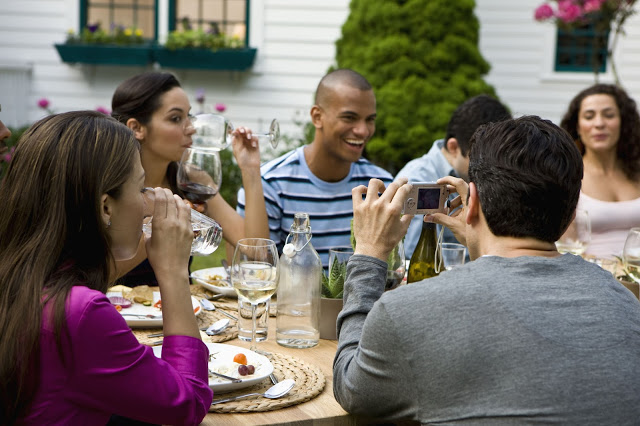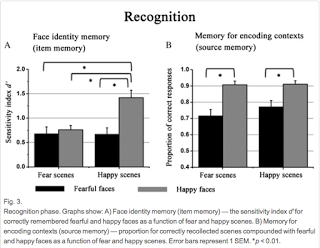Neuroscience
 When you smile at a party, your facial expression is emotionally consistent with the happy context and as a consequence other guests will in future be more likely to remember that they've seen your face before, and where you were when they saw you. That's according to a team of Italian researchers led by Stefania Righi who have explored how memory for a face is affected by the emotion shown on that face and the congruence between that emotional expression and its surrounding context.
When you smile at a party, your facial expression is emotionally consistent with the happy context and as a consequence other guests will in future be more likely to remember that they've seen your face before, and where you were when they saw you. That's according to a team of Italian researchers led by Stefania Righi who have explored how memory for a face is affected by the emotion shown on that face and the congruence between that emotional expression and its surrounding context.
The researchers first presented 30 participants (11 men) with 64 unfamiliar face and scene pairings. The faces were either smiling or fearful and they were either presented alongside an image of a happy scene (e.g. a party) or a fear-inducing scene (e.g. a car crash). The participants' task at this stage was simply to indicate whether each face-scene pairing was emotionally congruent or not.
Next came the memory test. Different faces (some previously seen, some new) were flashed up on-screen against a black background and the participants had to say whether they'd seen the face before or if it was entirely new. After each face, three scenes appeared of the same genre (e.g. three party scenes), and the participants had to say which specific scene the face had previously appeared alongside.
Previously seen happy faces were better remembered than fearful faces, but only when they appeared alongside a happy scene. Memory for fearful faces, by contrast, was unaffected by the congruence of the accompanying scene. Why should smiling faces at a party or other happy context be better remembered than a fearful face? The researchers think the combination of a smiling face and happy scene has a broadening effect on observers' attention, enhancing their memories for the face. From a methodological point of view, it's a shame the study didn't also feature neutral faces: without these, we can't be certain whether smiling faces in a happy context were enhancing memory or if fearful faces in that context were harming memory, or a bit of both.
The researchers also propose that smiling faces have a "unitising effect" whereby the face and its context are bound together in memory. This idea also appeared to be supported by the results: participants were better at remembering the accompanying scenes (happy and fearful) for smiling faces than fearful faces.
Put these two key results together and it means that we're particularly likely to remember a smiling face we saw at a party, and the specific context we saw it in. Righi and her colleagues said it made sense for memory to work this way. "A smiling person communicates a social bond and the ability to remember, not only the face identity, but also the context of the first encounter with that 'potential friend', could reflect an adaptive behaviour in view of future social relations." The new results also complement past research on memory for face-name pairings: presented with a name, participants were better at remembering when it was earlier paired with a happy face than a neutral one.
_________________________________
Righi, S., Gronchi, G., Marzi, T., Rebai, M., & Viggiano, M. (2015). You are that smiling guy I met at the party! Socially positive signals foster memory for identities and contexts Acta Psychologica, 159, 1-7 DOI: 10.1016/j.actpsy.2015.05.001
Post written by Christian Jarrett (@psych_writer) for the BPS Research Digest.
- Scared Face Processed More Quickly When Seen Out Of The Corner Of The Eye
The brain processes fearful faces more quickly when seen out of the corner of the eye than when viewed straight on. Dimitri Bayle and colleagues, who made their finding using magnetoencephalography (MEG) brain scanning, believe this bias has probably...
- Violent Video Games Slow Our Processing Of Happy Faces
Just 15 minutes playing a violent video game can lend a negative bias to the way we interpret people's facial expressions. Steven Kirsh and Jeffrey Mounts at SUNY-Guneseo in New York asked 197 students to play either 15 minutes of the violent House...
- Women Have A Superior Memory For Faces
Women are better at remembering faces than men, probably because they're more interested in social aspects of the world than men are. That's according to Jenny Rehnman and Agneta Herlitz who presented 212 Swedish men and women with 60 faces to...
- Face-recognition Problems More Common Than Previously Thought
Problems recognising faces, brought on by brain injury, could be more prevalent than previously thought. That’s according to Tim Valentine and colleagues who argue there’s been an over-reliance on ‘pure’ cases, and that “it is easy to dismiss...
- Why Moving Faces Are Easier To Recognise
Psychologists have previously shown that moving faces are easier to recognise than a static image of a face. Karen Lander and Lewis Chuang at the University of Manchester sought to find out why. In a first experiment, 48 psychology students viewed degraded...
Neuroscience
Smile at a party and people are more likely to remember seeing your face there

The researchers first presented 30 participants (11 men) with 64 unfamiliar face and scene pairings. The faces were either smiling or fearful and they were either presented alongside an image of a happy scene (e.g. a party) or a fear-inducing scene (e.g. a car crash). The participants' task at this stage was simply to indicate whether each face-scene pairing was emotionally congruent or not.
Next came the memory test. Different faces (some previously seen, some new) were flashed up on-screen against a black background and the participants had to say whether they'd seen the face before or if it was entirely new. After each face, three scenes appeared of the same genre (e.g. three party scenes), and the participants had to say which specific scene the face had previously appeared alongside.
Previously seen happy faces were better remembered than fearful faces, but only when they appeared alongside a happy scene. Memory for fearful faces, by contrast, was unaffected by the congruence of the accompanying scene. Why should smiling faces at a party or other happy context be better remembered than a fearful face? The researchers think the combination of a smiling face and happy scene has a broadening effect on observers' attention, enhancing their memories for the face. From a methodological point of view, it's a shame the study didn't also feature neutral faces: without these, we can't be certain whether smiling faces in a happy context were enhancing memory or if fearful faces in that context were harming memory, or a bit of both.
 |
| Figure 3 from Righi et al, 2015. |
Put these two key results together and it means that we're particularly likely to remember a smiling face we saw at a party, and the specific context we saw it in. Righi and her colleagues said it made sense for memory to work this way. "A smiling person communicates a social bond and the ability to remember, not only the face identity, but also the context of the first encounter with that 'potential friend', could reflect an adaptive behaviour in view of future social relations." The new results also complement past research on memory for face-name pairings: presented with a name, participants were better at remembering when it was earlier paired with a happy face than a neutral one.
_________________________________

Righi, S., Gronchi, G., Marzi, T., Rebai, M., & Viggiano, M. (2015). You are that smiling guy I met at the party! Socially positive signals foster memory for identities and contexts Acta Psychologica, 159, 1-7 DOI: 10.1016/j.actpsy.2015.05.001
Post written by Christian Jarrett (@psych_writer) for the BPS Research Digest.
- Scared Face Processed More Quickly When Seen Out Of The Corner Of The Eye
The brain processes fearful faces more quickly when seen out of the corner of the eye than when viewed straight on. Dimitri Bayle and colleagues, who made their finding using magnetoencephalography (MEG) brain scanning, believe this bias has probably...
- Violent Video Games Slow Our Processing Of Happy Faces
Just 15 minutes playing a violent video game can lend a negative bias to the way we interpret people's facial expressions. Steven Kirsh and Jeffrey Mounts at SUNY-Guneseo in New York asked 197 students to play either 15 minutes of the violent House...
- Women Have A Superior Memory For Faces
Women are better at remembering faces than men, probably because they're more interested in social aspects of the world than men are. That's according to Jenny Rehnman and Agneta Herlitz who presented 212 Swedish men and women with 60 faces to...
- Face-recognition Problems More Common Than Previously Thought
Problems recognising faces, brought on by brain injury, could be more prevalent than previously thought. That’s according to Tim Valentine and colleagues who argue there’s been an over-reliance on ‘pure’ cases, and that “it is easy to dismiss...
- Why Moving Faces Are Easier To Recognise
Psychologists have previously shown that moving faces are easier to recognise than a static image of a face. Karen Lander and Lewis Chuang at the University of Manchester sought to find out why. In a first experiment, 48 psychology students viewed degraded...
